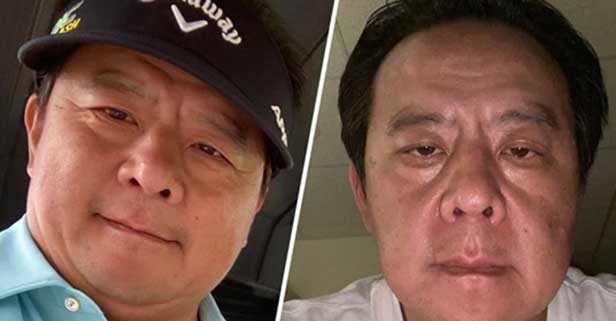A Promo Pro’s Fight Against COVID-19
Randy Chen shares an in-depth account of the harrowing personal health battle he went through after contracting the coronavirus.
The way Randy Chen tells it, COVID-19 had one simple, deadly mission: It was doing everything it could to stop his breathing.
The New Jersey man admits there were times during his personal health battle with the coronavirus that the disease came close to doing just that.
But after weeks of fighting, Chen is now on the other side of the virus, nearing a clean bill of health.
Podcast Chapters
1:47 – The first sign of symptoms.
6:06 – “You got hit,” the doctor said. “You tested positive.”
7:15 – Chen’s son tests positive for COVID-19, too.
12:46 – What it feels like to have the virus.
16:14 – Unexpected help from medicine.
23:20 – “I could taste again.”
25:08 – The emotional toll.
30:23 – Thankful for the support of family and friends.

On the left is Randy Chen before he contracted the coronavirus. On the right is how he looked during some of the worst of his struggles with the disease.
![]() In this Promo Insiders podcast, Chen details his battle to survive. The president of Impex International, which provides direct import and warehousing services for promotional products companies, explains how for three weeks he has self-isolated in his basement.
In this Promo Insiders podcast, Chen details his battle to survive. The president of Impex International, which provides direct import and warehousing services for promotional products companies, explains how for three weeks he has self-isolated in his basement.
He tells of how COVID-19 would steal his air, robbing him of sleep, peace of mind and his senses of smell and taste. “I felt fear,” admits Chen, who kept a daily journal through his ordeal. “There were times when I cried.”
He shares the guilt he felt, wrought with worry that he might have passed the virus on to someone else before he was aware he was sick and quarantined. In fact, he did unwittingly give his son COVID-19, though the hale and healthy 21-year-old has since recovered.
Chen details the love, care and courage of his wife, who’d cook for him and leave the food at the top of steps that lead down from his garage to his basement. At meal times, she’d text him to let him know the food was there. “It was like feeding an animal at the Philadelphia Zoo,” jokes Chen, who through it all maintained his sense of humor.
Still, Chen details how, at times, he was truly concerned for his life; his wife would worry if he didn’t reply to one of her texts within five minutes that he’d dropped into unconsciousness or worse.
Chen believes his recovery is thanks, at least in part, to taking hydroxychloroquine sulfate, a drug used to treat malaria. While he couldn’t get the medicine stateside, he was able to obtain some from Taiwan through medical connections in his personal network. He took the regimen under consultation from doctors. “I took two pills on (March 24) and the next morning I was able to taste the sausage and pancakes my wife made for breakfast,” says Chen. “It was a turning point.”
“Hydroxychloroquine sulfate and chloroquine phosphate are oral prescription drugs approved to treat malaria and other diseases. Although there are no currently approved treatments for COVID-19, both drugs have shown activity in laboratory studies against coronaviruses, including SARS-CoV-2 (the virus that causes COVID-19),” the federal Department of Health & Human Services said in a press release. “Anecdotal reports suggest that these drugs may offer some benefit in the treatment of hospitalized COVID-19 patients. Clinical trials are needed to provide scientific evidence that these treatments are effective.”
By April 6, Chen expected that health authorities were going to allow him to end his self-isolation, provided he’s been fever free for 72 hours. He plans to donate plasma to help fuel research efforts toward finding a cure/vaccine for COVID-19.
Chen is beyond grateful for the love and support he’s received from family and friends – most of all his wife. He is, of course, also deeply grateful just to be alive.
Still, having the coronavirus has probably changed some things forever.
“What’s normal?” Chen says. “I’m not sure things will ever really return to what you’d call normal.”
